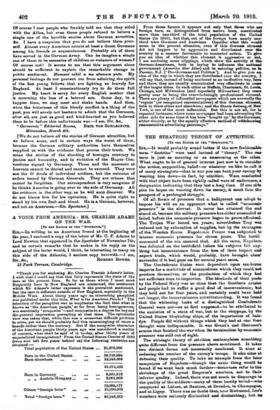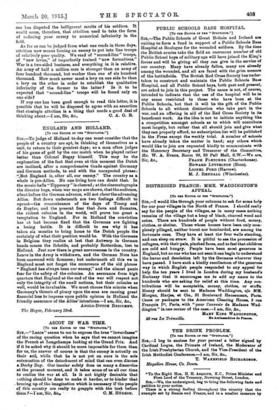THE STRATEGIC THEORY OF ATTRITION. [To THE EMS= or ran
••Noncrsvoun Srn„—It would probably sound better if the now fashionable term- "doctrine" were used instead of "theory." The one term is just as meaning or as unmeaning as the other. What ought to be of general interest just now is to consider• the notion, supposition, belief—or whatever we like to call it of many strategists—that in war you can beat your enemy by wearing him down—in fact, by attrition. Ware courisated with that object have been rightly sailed wars of endurance, a designation indicating that they last a Mug time_ If one site pins its hopes on wearing down its enemy, it. mast face the prospect, of a prolonged straggle.
Of all forms. of pressure that a belligerent can adopt to impose his will on an opponent what is called ."econoniie preemie" is the slowest. It. never bas attsioed the end aimed at, because the military pressure has either succeeded sr failed before the economic. pressure began to prove effectual. The Trojan War lasted ten years; nevertheless Troy was reduced not by exhaustion of supplies, bat by the stratagem of. the. Wooden Berm. Napoleonic France was subjected to intense economic pressure for eleven years. The borta command of the sea ensured that All the same, Napoleon was defeated on the battlefield before hia subjects felt any. thing but inconvenience from the loss of their import cad export trade, which would, probably, have brought. abase surrender if it had gone on forsereral years more, The Confederate States were dependent upon sea-borne imports for a multitude of commodities which. they could. mat produce themselves, or the production of which they had not sufficient time to improvise. The blockade of their ports by the Federal Navy.was so oboe that the Southern armies and people had to gaffer a good deal of inommenience; last they held out for four_ years, and certainly meld have held out longer, the inconveniences notwithstanding. It was found that the whitening locks of a distinguished Confederate General were not—as at first supposed—to be attributed to the anxieties of a state of war, but to the stoppege, by the United States blockading ships, of the importation of hair- dye. People did without things whisk they had at one time thought were indisperusable. It was Grant's and Sherman's armies that finished the war when its termination by economic pressure was still out of sight.
The strategic theory of attrition contemplates something quite different from the pressure above mentioned. It takes two distinct forms not ,resevarily combined It Ethig, at reducing the number of the enemy's troops. It also aims at debasing their quality. To take an example from the tater campaigns of Napoleon—though the same thing would he fotind if we went back much farther--historiana refer to the shrinkage of the great Emperor's smothers, sot to their inferior quality. Indeed, there was not MOBIL to disparage in the quality of thesoldiera—many of them hastily levied—who conquered at Iiiitzen, at Bautzen, at Dresden. is Champagne, and at Lignyt There was no doubt that. near Richmond, Lee's numbers were seriously diminished and diminishing; but no
ano has disputed the belligerent merits of his soldiers. It would seem, therefore, that attrition need to take the form of reducing your enemy to numerical inferiority in the field.
As far as can be judged from what one reads in these days, attrition now means forcing an enemy to put into line troops of relatively poor quality. We read of " second-line " troops, of "new levies," of imperfectly trained "new formations." War is a two-sided business, and everything in it is relative. An army of half a million men is stronger than an army of four hundred thousand, but weaker than one of six hundred thousand. How much newer must a levy on one side be than a levy on the other• in order to establish the qualitative inferiority of the former to the latter P Is it to be expected that " seconilline " troops will be found only on one side ?
If any one has been good enough to read this letter, it is possible that he will be disposed to agree with an assertion that strategic attrition is a thing that needs a good deal of thinking ahont—I am, Sir, Sc., C. A. G. B.







































 Previous page
Previous page